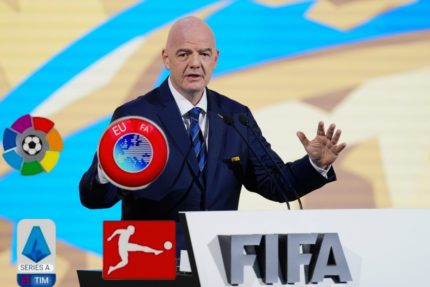In a landmark move, the European Leagues, representing 39 leagues and 1,130 clubs across 33 countries, alongside global players’ union Fifpro, are set to initiate legal action against FIFA. The complaint, which will be filed with the European Commission, is a response to FIFA’s alleged “abuse of dominance” within the sport of football. The crux of the complaint revolves around FIFA’s decisions concerning the international match calendar and their perceived detrimental impact on player welfare and national leagues.
This decision emerges from mounting concerns voiced by leagues and player unions, notably the Professional Footballers’ Association (PFA), regarding the congested football calendar. Fifpro has criticized the international calendar as being “beyond saturation,” deeming it “unsustainable for national leagues” and a significant “risk for the health of players.” The statement highlights how FIFA’s recent decisions have consistently prioritized its own commercial interests over the welfare of players and the economic stability of national leagues.
Criticism of FIFA’s Decision-Making and Process
The European Leagues and Fifpro argue that FIFA has repeatedly failed to incorporate national leagues and player unions into its decision-making processes. They have called for a more transparent approach to developing the international match calendar, citing a lack of consultation on crucial decisions such as the expansion of the Club World Cup. This expansion, which will see Manchester City and Chelsea among the 12 European clubs participating in the 2025 tournament in the USA, has been a point of contention. FIFA had previously denied claims that it had not engaged sufficiently with Fifpro and the World Leagues Association on this issue.
In response to the legal action, FIFA has accused the European leagues of hypocrisy. The organization claims that the current international calendar was approved unanimously by the FIFA Council, which includes representatives from all continents, including Europe. FIFA’s spokesperson argued that the calendar is essential for the survival and prosperity of international football and criticized European leagues for prioritizing commercial interests over global football welfare. FIFA maintains that their role in regulating and organizing international football is vital and should not be undermined by commercial self-interest.
Ongoing Legal Challenges and European Employment Law Issues
The legal action by the European Leagues and Fifpro is part of a broader trend of legal challenges facing FIFA. Just two months prior, the PFA, along with French and Italian players’ unions, filed a separate claim at the Brussels court of commerce. This case, supported by Fifpro’s European office, focuses on employment law issues, FIFA’s management of the international calendar, and the introduction of new competitions that may conflict with players’ employment rights.
Fifpro has highlighted the inherent conflict of interest in FIFA’s dual role as both the global football regulator and a competition organizer. The ongoing disputes underscore the tension between FIFA’s regulatory authority and the operational realities faced by national leagues and players. As the legal battles continue, the future of football’s organizational structure and player welfare hangs in the balance, with significant implications for the sport’s governance and the well-being of its global workforce.
The PFA’s Growing Discontent: A Call for Change
In May, Maheta Molango, the chief executive of the Professional Footballers’ Association (PFA) and a board member of FifPro, voiced significant concerns regarding the current state of the football fixture calendar. Molango emphasized that players are nearing a breaking point due to excessive workloads and warned that strikes could become a reality if conditions do not improve. The expanded Club World Cup has necessitated a rescheduling of the next African Cup of Nations to December 2025 and January 2026, which is expected to interfere with the Champions League knockout stages. Molango’s statements underscore the mounting frustration among players who feel that their concerns about the congested fixture list are being consistently ignored.
Molango criticized the ongoing approach to the football calendar, arguing that it is unsustainable and places undue stress on players. He warned that the current system, which forces players to continuously adapt, is flawed and needs urgent reform. The PFA’s concerns are a significant indication of the wider discontent within the sport, and Molango’s remarks reflect a growing sense of urgency among players and their representatives. “It’s just not tenable to continue to argue that this approach to the fixture calendar is working,” Molango stated, highlighting the critical need for a systemic change to alleviate the pressures faced by players.
The Prospect of Legal Action: Unions and Leagues Unite
The threat of legal action by football unions and leagues, including the Premier League, represents a significant escalation in the ongoing dispute over fixture scheduling. Historically, unions have been quick to champion the rights of their members, but the backing from major leagues adds weight to the current legal threat. This collective stance is seen as a last resort after prolonged discussions and failed negotiations with governing bodies like FIFA. The legal challenge is viewed as the “nuclear option,” a drastic measure intended to prompt serious reconsideration of the football calendar’s structure.
FIFA has been accused of hypocrisy, with critics pointing to the contrast between the global tours undertaken by clubs and the purported consultations with FifPro regarding the calendar. FIFA is expected to mount a strong defense, arguing that they have engaged with stakeholders and are committed to addressing the concerns raised. However, the unified front of unions and leagues indicates a robust determination to pursue legal action if necessary. This move underscores the serious intent of the players’ representatives and their resolve to secure a more balanced and fair fixture schedule. If an out-of-court resolution is not achieved, the legal proceedings are likely to continue, pushing the debate on fixture congestion to the forefront of football governance














